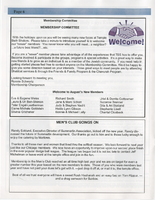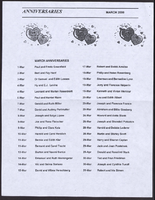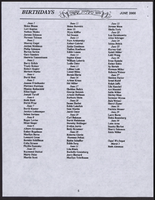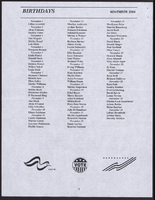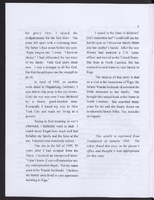Search the Special Collections and Archives Portal
Search Results

Miguel Villarba oral history interview: transcript
Date
Archival Collection
Description
Oral history interview with Miguel Villarba conducted by David Islas on December 6, 2021 for Reflections: The Las Vegas Asian American and Pacific Islander Oral History Project. In this interview, Miguel Villarba shares his family's history growing up in Manila, Philippines and immigrating to the United States in 2016. He talks about first living in Chattanooga, Tennessee before moving to Las Vegas, Nevada to be near family when Miguel was in high school. Miguel Villarba shares stories of his grandfather's farm in Pangasinan, Philippines, the differences in city and town life across Manila, Chattanooga, and Las Vegas, and his educational plans. He also talks about Filipino culture and traditions, and racial discrimination.
Text

Kaku Makino and Masako "Julie" Ishitsuka oral history interview: transcript
Date
Archival Collection
Description
Oral history interview with Kaku Makino and Masako "Julie" Ishitsuka conducted by Kristel Peralta, Vanessa Concepcion, Ayrton Yamaguchi, and Stefani Evans on March 22, 2021 for the Reflections: The Las Vegas Asian American and Pacific Islander Oral History Project. In this interview, Makino discusses his early life in Tokyo, Japan and becoming a chef. He recalls arriving to the United States in 1989, establishing the Todai (now Makino Sushi & Seafood Buffet) restaurant chain, and opening nineteen locations in California, Florida, and in Hawaii. Kano talks about her upbringing in Otsu, Shiga Prefecture, Japan and describes Japan during the Meiji era. She remembers arriving to Las Vegas, Nevada in 2000 and the cultural change she experienced. Lastly, Makino and Kano discuss the restaurant industry during the COVID-19 pandemic.
Text
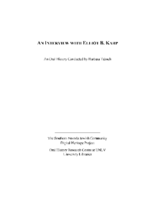
Transcript of interview with Elliot B. Karp by Barbara Tabach, December 17, 2014
Date
Archival Collection
Description
Interview with Elliot B. Karp by Barbara Tabach on December 17, 2014. In this interview, Elliot Karp discusses growing up in a culturally Jewish household in New York and becoming more observant in his teenage and college years. He decided, after a trip to Israel and a year in a rabbinical program, that he wanted to be a "Jewish professional" with a focus on social work and community organizing, and attended a Master's program at Brandeis University. Karp goes on to talk about his work for the Jewish Federation in Ohio and Pennsylvania, and being recruited to come to Las Vegas. He talks about the challenges in the Las Vegas Jewish community and the Jewish Federation's role as an umbrella organization to partner with other agencies to grow and sustain a robust Jewish community in Southern Nevada.
On October 6, 1955, Elliot Karp was born in Mineola, New York to parents of East European heritage who identified as culturally Jewish. As a teenager, Elliot felt the calling to become kosher, balancing this practice with household norms that were not as strict. He eventually became shomer Shabbat just after enrolling at State University of New York at Stony Brook, where he majored in Political Science. After graduating from SUNY, Elliot spent a year living in Israel considering a path in rabbinical studies. By the end of his time, he decided on a different, yet related path, and registered as a graduate student in Brandeis University's School of Jewish Communal Service, on fellowship from Council of Jewish Federations. After graduating, Elliot moved to Columbus, Ohio to work for the Jewish Federation, focusing on fundraising, but was exposed to many different operational areas of the organization. After three years, Elliot was recruited to the Philadelphia office as its director of leadership development. He then left the Federation to work in development at Brandeis University, but after two years, returned to the Federation as the Cincinnati office's chief development officer. In 2008, Elliot received a call to take his highly cultivated leadership and fundraising skills to another Federation office: Las Vegas. After much consideration, he took the job - and challenge - as the office's new chief executive officer. Since then, Elliot has done much to promote communication, coordination and collaboration within the local Jewish community and beyond, through relationship building and successful fundraising efforts. His ultimate desire is to expand funding for programs that get more people involved in Jewish life - while also empowering community members define what a Jewish life means for them.
Text

Transcript of interview with Dr. Jacob Paz by Claytee White, September 15, 2014
Date
Archival Collection
Description
During the 1950s, Dr. Jacob Paz grew up in an agricultural environment in Israel where he attended a very famous high school in Israel called Kadoorie where Yitzhak Rabin was a student. After his graduation, Jacob joined the Israeli army building his skills so that he could get into technical school after he fulfilled his army service. For two years he attended technical school and then started working for the Israel Atomic Energy Commission in Dimona, Israel making atomic bombs in the 1960’s. After working in Dimona, Jacob was accepted into UC Davis and moved to the United States to study veterinary medicine. After one semester, he realized that he preferred history and left California for New York City, There he earned degrees in Jewish history and chemistry from the Jewish Theological Seminary. He quickly moved onto graduate school and earned his master’s degree in marine science and environment from CW Post, Long Island University in Greenvale, New York. In 1972, he returned to I
Text

Transcript of interview with Marcy and Jack Simon by Barbara Tabach, May 16, 2018
Date
Archival Collection
Description
It was 1964 when Jack Simon met Marcy Stiel at a mutual friend’s wedding. Smitten from the beginning, the couple married shortly thereafter. Thus began their loving partnership that has flourished in business, community involvement, and most importantly in raising their two sons, Ron and Steven. The Simon’s can be a modest power couple. However, they are clearly capable of making things happen. When they first married, Jack was a California electrical contractor and homebuilder and Marcy became his business administrator. The Simons through their Electrical Company, Expo-Tech Electrical & Plumbing Services, Inc. won the contract to provide all of the electrical services for the entire 1984 Los Angeles Olympics, encompassing (26) twenty six venues located in California spanning from San Diego to Stanford University. The trajectory of the business was extraordinary, establishing twelve offices nationwide to provide temporary electrical and plumbing services for conventions and special events. Expo-Tech was eventually bought by industry giant GES. Their success was due in large part to Jack’s technical knowledge and Marcy’s administrative and marketing skills. With entrepreneurial zest, and over the period of eleven years, the couple found their way into the ownership of four local casinos in Elko and Wendover Nevada. Marcy was one of the first women in Nevada to hold multiple gaming licenses. In total, she held four Unrestricted Gaming Licenses. The Simons hosted Passover Seders for the Elko Jewish Community during their ownership of the casinos. In 2004, Marcy and Jack sold the four casino operations. Since moving to Nevada in 1994, the couple has made a warm and lasting impression, being generous in their focus for the well-being of the Jewish community. They are among those that actively paved the way for SB26, which outlaws government bodies from conducting business with companies that boycott Israel. They continue to be tireless advocates and philanthropists in Jewish organizations of Las Vegas and Nevada.
Text

